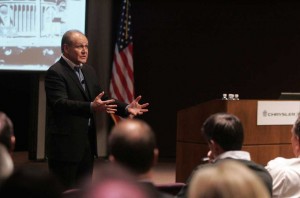
Nardelli is to meet with the auto task force, hoping to forestall the bankruptcy demanded by Senator John McCain, and others in the GOP.
Forget what you’ve heard about the GOP being the “party of business,” unless you believe that bankruptcy is the best way to save American manufacturing. A chorus of Senate Republicans is calling for the Obama Administration to let General Motors Corp. and Chrysler go bankrupt, rather than handing out billions of dollars in additional aid.
That’s a very real possibility, though the Administration has yet to take a definitive stand. For the moment, it continues pressing the troubled Detroit makers to work up their final viability plan, which is due in Washington on March 31st. Meanwhile, lead members of the White House’s automotive task force – Wall Street fund manager Steve Rattner and restructuring expert Ron Bloom — will be spending the day in the Motor City, meeting with GM and Chrysler executives, as well as Ron Gettelfinger, president of the United Auto Workers.
Among the most vocal opponents of additional aid is the defeated GOP presidential candidate and Arizona Senator John McCain, who declared, on Fox News Sunday, “The best thing that could probably happen to General Motors, in my view, is they go into Chapter 11.”
Even some Democrats have begun to argue that the only way to resolve the domestic auto industry’s problems would be a court-ordered restructuring, in which significant changes to outstanding debt could be mandated. The UAW’s existing contract would also come up for review and a bankruptcy overseer would have the ability to declare the agreement void, as happened with Delphi Corp., which last year halved the pay of its union workers and, more recently, got the court okay to slash retiree health care benefits.
The union, in fact, appears to be at the center of much of the GOP’s concerns about the bailout. “The UAW will run those companies and run them into the ground,” asserted Senator Richard Shelby, of Alabama. The top Republican on the Senate Banking Committee, Shelby has been dubbed, by his own critics, as one of the “Senators from Toyota,” a reference to the fact that some of the GOP’s sharpest bailout critics also happen to represent states where Toyota and other foreign automakers operate non-union assembly lines.
Ironically, many of the import makers have been taking a more conciliatory tone – at least for public consumption – regarding a bailout. “If you peel the onion back,” Toyota Executive Vice President Bob Carter told TheDetroitBureau.com, the supplier base and then the dealers (are) very much intermingled. So, what’s best for Toyota is a healthy auto mind where the Big Six (U.S. and Japanese makers) are flourishing. If any are struggling, it puts everyone at risk.” While Carter wouldn’t specifically support a bailout, he suggested that, “anything that stabilizes the industry and puts confidence back for consumers, is good for the industry.”
The bankruptcy debate is largely, but not entirely, defined along party lines. GOP House member Thadeus McCotter, who represents a suburban Detroit constituency largely tied to the auto industry, warned that if GM and Chrysler are forced into Chapter 11, “they will not come out.”
Many analysts, including Joe Phillippi, of AutoTrends Consulting, echoed that concern, warning that there’s a high likelihood that the carmakers would simply be unable to restructure and emerge as viable entities.
Despite the drumbeat of criticism from Republican leaders, the Obama Administration appears unwilling to cede control of the debate, much as it refused to let the GOP take control of the stimulus package and budget. But the automakers will still have to make a strong case to the automotive task force, and circumstances continue to work against their bid for help.
Last week, GM’s own auditors, Deloitte & Touche, warned in the automaker’s annual report, there was “substantial doubt” the company could turn itself around. That followed only days after February sales numbers were released, showing that GM’s volumes fell 53 percent compared to an already-weak period a year earlier.

What would expect from the party of Herbert Hoover? Republican economic policies over the last thirty years have essentially been the greatest wealth redistribution plan in history. The have redistributed wealth from the poor and middle class to the already wealthy. They have done and, as this latest “screw the unions” stance shows, continue to do everything they can to undermine the middle class in this country. The result is they have driven us to the brink of a new Great Depression.